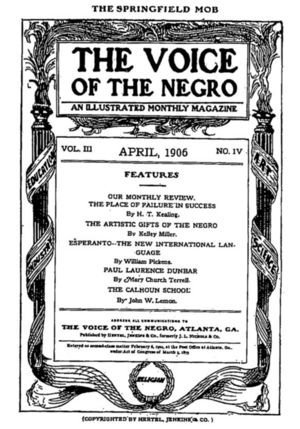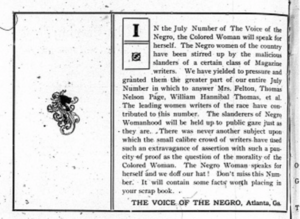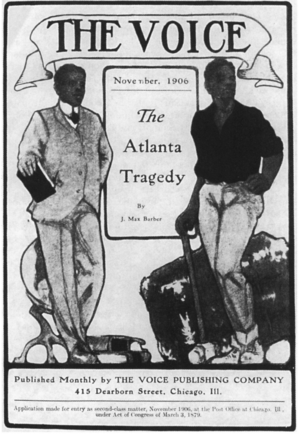The Voice of the Negro facts for kids

Cover Page of The Voice of the Negro Volume III, April 1906. Atlanta: Hertel, Jenkins, and Company, 1906
|
|
| Editor | John W. E. Bowen, Sr. and Jesse Max Barber |
|---|---|
| Frequency | Monthly |
| Publisher | J.L. Nichols and Company (Jan. 1904 – Apr. 1904)
Hertel, Jenkins, and Company (May 1904 – July 1906) Voice Publishing Company (Aug. 1906 – Oct. 1907) |
| First issue | 1904 |
| Country | United States |
| Based in | Atlanta, Georgia (Jan. 1904 – July 1906) Chicago, Illinois (Aug. 1906 – Oct. 1907) |
| Language | English |
The Voice of the Negro was an important magazine for African Americans published from 1904 to 1907. It was started in Atlanta, Georgia in 1904 by Austin N. Jenkins. He was a white manager of a publishing company. However, he gave full control of the magazine to two Black editors: John W. E. Bowen, Sr. and Jesse Max Barber.
The magazine moved to Chicago after a difficult event in Atlanta in September 1906. It stopped being published in 1907. The Voice of the Negro featured writings by famous Black leaders and thinkers. These included Booker T. Washington, W. E. B. Du Bois, Mary Church Terrell, and Paul Laurence Dunbar.
Contents
The Magazine's Story
How it Started
The Voice of the Negro was the first magazine for African Americans that started in the Southern United States. It began in Atlanta in 1904. Austin N. Jenkins, a white publisher, created it. But he let Black editors John W. E. Bowen, Sr. and Jesse Max Barber run it completely.
Barber and Bowen wanted the magazine to record "current and sociological history." They hoped it would be a valuable document for future generations. Atlanta had many Black colleges and schools at the time. The editors also wanted to strengthen Black voices in literature and politics there.
The magazine's goals were shared in its first issue in January 1904. It said it would keep readers updated on history, education, art, science, and race issues. It also proudly stated it was the first magazine edited by Black men in the South. The editors wanted it to be a "necessity in cultured colored homes." They also hoped it would inform white homes about Black hopes and dreams.
The editors wanted the magazine to be independent. This meant it would not take sides in politics. They also wanted to bridge the gap between the ideas of W. E. B. Du Bois and Booker T. Washington. However, Booker T. Washington tried to influence the magazine. His secretary even became an editor for a short time.
At first, the magazine published articles from both Du Bois and Washington. But after a conflict, the magazine became openly against Washington's ideas from 1905 onwards.
Political Influence
The Voice of the Negro became a strong political voice in the early 1900s. It discussed national and local political figures. It also shared how both Black and white people viewed their work. Important figures in these discussions included W. E. B. Du Bois, Booker T. Washington, and Theodore Roosevelt.
Booker T. Washington was seen as a major leader for Black people after his speech in Atlanta in 1895. The Voice of the Negro helped inspire Black thinkers across the country. It even helped W. E. B. Du Bois start his political group, the Niagara Movement, in 1905. This group was made of "educated and elite blacks." They worked for political and social equality.
The magazine also supported Theodore Roosevelt's presidency in 1901 and 1904. Roosevelt spoke about "equality" and a "square deal" for everyone. After he was elected, he appointed Booker T. Washington as an advisor. He also appointed William Crum, a Black man, to a government job. These actions upset many white people in the South.
Roosevelt caused more tension when he invited Washington to a White House dinner. Even though Washington said it was just for the president's benefit, Roosevelt later expressed regret. In 1904, Roosevelt won the presidency again. The Voice of the Negro said he won because most Americans believed in fairness for all races.
However, the magazine later criticized Roosevelt. It felt he did not do enough to protect Black people's rights. It also expressed anger about the Brownsville, Texas incident. In this event, a riot by white citizens led to deaths and injuries. The Voice of the Negro truly became a voice for the Black community's feelings.
Social and Educational Goals
Through its articles, The Voice of the Negro worked to help Black people grow socially and educationally. The magazine promoted "Black pride" and "Black self-respect." It encouraged Black people to seek all their legal rights and freedoms.
For example, the magazine told Black people not to copy white culture so much that they lost appreciation for their own beauty. It also said that freedom of speech and press were limited in the South. So, it encouraged people of all races to bravely stand up for everyone's rights. The magazine also described what a Black man should be like: someone who sees himself as worthy and demands equal treatment from white people.
The Voice of the Negro also pushed for better education for Black people. It especially supported higher learning institutions. Two universities praised by the magazine were Atlanta University and Tuskegee University. Atlanta University was the first higher education school in Georgia to accept students of all backgrounds. The magazine praised it for believing in practical education that helps people understand themselves and others.
Booker T. Washington was the head of Tuskegee University. The magazine praised his efforts to build the school, despite any mistakes he made. The Voice of the Negro recognized Washington's success. It honored his hard work in supporting his race and nation. Even though the leaders of these schools had different ideas, the magazine still celebrated their success in helping Black people get an education.
The Magazine's End
There were many difficult events in Georgia in the early 1900s. The event that most affected the magazine was the Atlanta Riot of 1906. One of the main editors, Jesse Max Barber, was very angry. People were wrongly blaming Atlanta's Black population for the riot. So, he secretly wrote in a newspaper that the white press was at fault.
White leaders eventually found out he was the author. He was threatened with arrest. To avoid this, Barber moved to Chicago. He continued publishing the magazine there, but under a shorter name: The Voice. However, after moving, the magazine faced money problems. There was also increasing pressure from Booker T. Washington's supporters. Because of this, Barber had to stop publishing the magazine in October 1907.
Images for kids
 | Janet Taylor Pickett |
 | Synthia Saint James |
 | Howardena Pindell |
 | Faith Ringgold |




